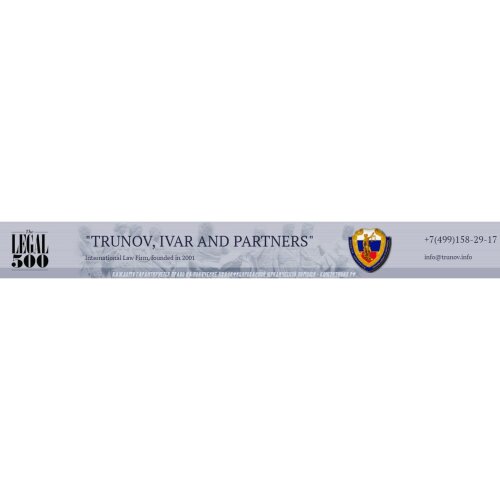Best Faith-Based Law Lawyers in Russia
Share your needs with us, get contacted by law firms.
Free. Takes 2 min.
Or refine your search by selecting a city:
List of the best lawyers in Russia
About Faith-Based Law in Russia
The concept of Faith-Based Law in Russia intersects with the legal frameworks that govern religious practices and organizations within the country. The Russian Federation embodies a secular state model, where religious freedom is constitutionally protected. However, this is regulated under federal law to balance religious expression with civic and social duties. The law pertains to aspects such as the registration of religious organizations, their activities, and the rights of congregations, while underlining principles that prohibit religious discrimination.
Why You May Need a Lawyer
There are several scenarios where individuals or organizations may require legal assistance in the domain of Faith-Based Law in Russia:
- Registration issues: Establishing a new religious organization or congregation often involves navigating complex registration requirements.
- Property disputes: Legal counsel can be critical in resolving disputes over property ownership or usage related to religious entities.
- Employment matters: Employment law issues within religious organizations can often require specialized legal advice.
- Freedom of religion: Situations involving perceived infringements on religious freedoms or navigating local laws that may restrict religious practices.
- Compliance: Ensuring that organizational activities comply with Russian laws and regulations.
Local Laws Overview
Faith-Based Law in Russia is primarily governed by the Federal Law on Freedom of Conscience and on Religious Associations, which establishes guidelines for the establishment, operation, and dissolution of religious organizations. Key aspects include:
- Registration Requirements: Religious groups must be registered to operate legally, which involves demonstrating adherence to specific criteria, such as a minimum number of founding members and a charter.
- Operational Restrictions: Certain activities, such as educational initiatives or foreign collaborations, are subjected to state scrutiny and regulation.
- Property and Financial Transactions: Religious organizations must adhere to strict financial reporting standards and property acquisition laws.
- Non-discrimination Statutes: Ensuring religious practices align with federal anti-discrimination laws.
Frequently Asked Questions
What is the process for registering a religious organization in Russia?
Registration typically requires submitting documents such as a charter, founding members' details, and proof of premises for worship to the Ministry of Justice. The process can be legally complex and often benefits from professional legal guidance.
Can foreign religious organizations operate in Russia?
Yes, but they must comply with specific regulations that require registration and may face restrictions on their activities, especially related to educational aspects or proselytization.
What are the rights of religious individuals in Russia?
Individuals have the right to freely practice their religion, form religious groups, and conduct religious ceremonies, subject to public order and safety regulations.
Are there restrictions on religious proselytization in Russia?
Yes, there are restrictions under the anti-terrorism laws colloquially known as the “Yarovaya laws,” which aim to control missionary activities and necessitate permits for public activities outside designated places of worship.
What legal protections exist against religious discrimination?
The Russian Constitution and various laws provide protections against religious discrimination, ensuring that individuals cannot be discriminated against based on their religious beliefs in various spheres of life, including employment and education.
How are religious properties governed under Russian law?
Religious properties are subject to standard property laws, but religious organizations must ensure that their property acquisitions and usage comply with religious and secular law alignments.
What recourse is available for resolving religious disputes in Russia?
Legal mechanisms are available through the Russian court system, where disputes can be adjudicated under civil law. Mediation and arbitration can also be potential pathways.
Are there specific tax regulations for religious organizations in Russia?
Religious organizations benefit from certain tax exemptions, but they must adhere to strict guidelines and reporting obligations to maintain their status.
How does Russian law address religious symbols and attire?
While Russian law does not explicitly regulate religious dress, attire, or symbols, these can be restricted in specific contexts for safety and public order reasons, particularly within government institutions like schools.
Is it possible to convert religions legally in Russia?
Individuals have the right to change or renounce their religion in Russia. However, public conversions require consideration of relevant legal requirements regarding public order and security.
Additional Resources
For additional guidance and information, consider consulting the following:
- The Russian Ministry of Justice: Oversees the registration and regulation of religious organizations.
- The Russian Orthodox Church: They provide resources for Orthodox communities and have legal resources regarding church-state law.
- Local legal aid organizations: Offering pro bono services or legal aid for understanding and dealing with faith-based legal issues.
Next Steps
If you require legal assistance in Faith-Based Law in Russia, consider the following steps:
- Consult with a legal professional specialized in religious or civil law to assess your specific situation.
- Gather all relevant documentation related to your case or concern.
- Consider engaging with local religious organizations or community groups for additional support and guidance.
- Utilize available legal aid services if you require financial assistance for your legal needs.
Lawzana helps you find the best lawyers and law firms in Russia through a curated and pre-screened list of qualified legal professionals. Our platform offers rankings and detailed profiles of attorneys and law firms, allowing you to compare based on practice areas, including Faith-Based Law, experience, and client feedback.
Each profile includes a description of the firm's areas of practice, client reviews, team members and partners, year of establishment, spoken languages, office locations, contact information, social media presence, and any published articles or resources. Most firms on our platform speak English and are experienced in both local and international legal matters.
Get a quote from top-rated law firms in Russia — quickly, securely, and without unnecessary hassle.
Disclaimer:
The information provided on this page is for general informational purposes only and does not constitute legal advice. While we strive to ensure the accuracy and relevance of the content, legal information may change over time, and interpretations of the law can vary. You should always consult with a qualified legal professional for advice specific to your situation.
We disclaim all liability for actions taken or not taken based on the content of this page. If you believe any information is incorrect or outdated, please contact us, and we will review and update it where appropriate.
Browse faith-based law law firms by city in Russia
Refine your search by selecting a city.
















